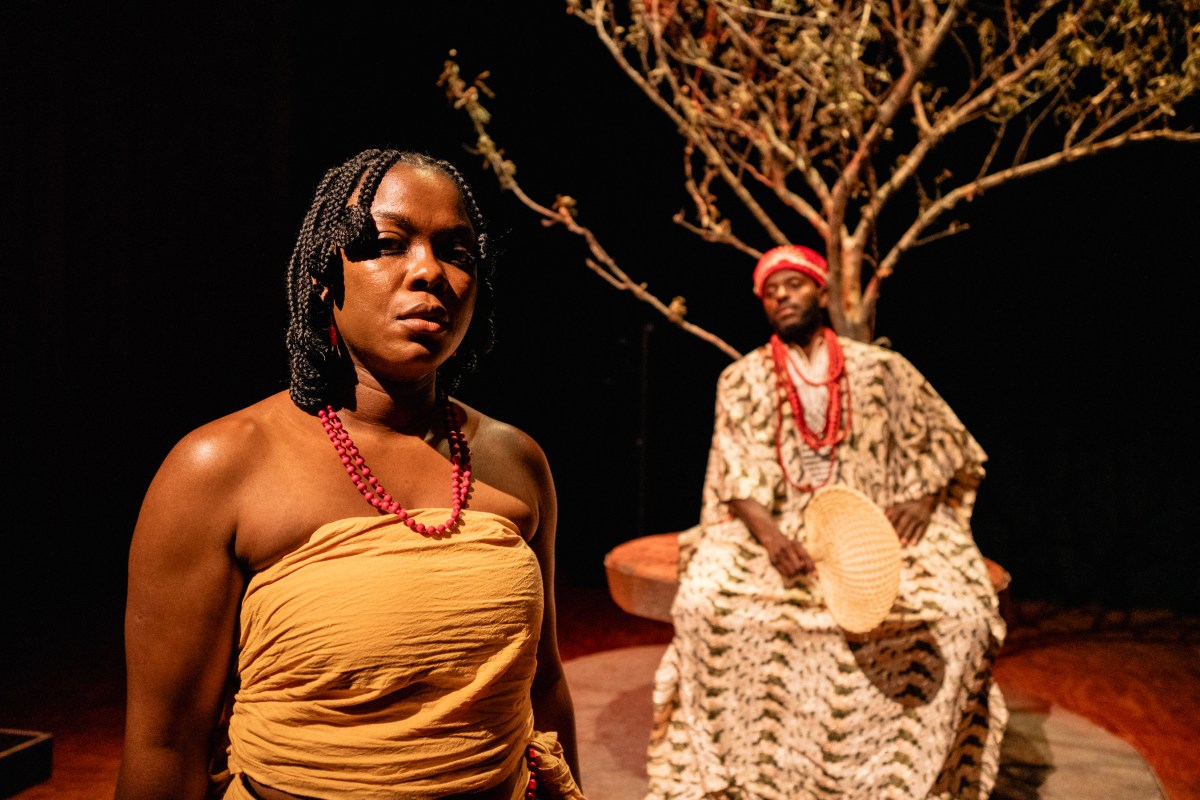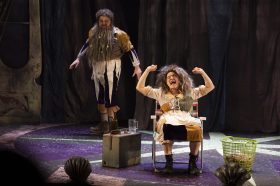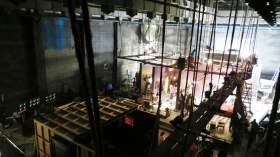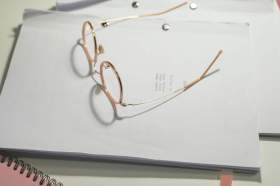Written by Nigerian-born spoken word poet, actor and writer Amarachi Logo and produced by Empty Seat, Akaraka is a new work that follows the story of second-generation Nigerian-Australian woman Adaeze, as she grapples with personal demons and feelings of not being sure of her place in the world. The word “Akaraka” is a West-African Ibo word meaning “destiny” or “fate” – with a literal translation of “hand-in-hand” (the future being written in your palm).
Adaeze’s connection with her ancestral origins is explored through a parallel story about a Nigerian princess, Olamma, who rejects her betrothed and falls in love with a charming wooer, Obiefuna (to her father’s disapproval), which cuts in and out of the work.
The play was performed at Melbourne’s Substation, with the stage set in promenade style, each seating bank facing inwards towards the long, vaulted ceilinged space. At the centre of the long promenade stage was an oval of sand, which is the space where Obiefuna confronted his rival in a physical challenge for the love of Olamma and later where Adaeze met with her ancestor on a spiritual plane.
At one end of the promenade was a dying tree, its leaves curled – the space given to most of the action between Obiefuna, Olamma and her father and betrothed – and at the other end a raised platform stage set with round kitchen table, where most of the scenes with Adaeze, her mother, her sister and her boyfriend played out.
The choice to divide the central promenade stage for the multiple narratives into sections meant that the most powerful central space felt underused – a stronger choice would have been to set the stage in the round, connecting with Akaraka’s themes of destiny and the reality of ancestral connection with the present. The few times when the actors walked outside their partitioned set, down the promenade, engaging with the audience, were some of the most powerful and dynamic scenes.
It’s a difficult ask to tell a story about one woman’s disconnection with culture and country through theatre – how do we know what is plaguing Adaeze? Yet it’s through the juxtaposition of the dynamic and colourful ancestral tale of a love triangle that we see Adaeze in sharp relief. She is depressed – falling deeper into a quagmire of personal despair, turning to alcohol and rejecting her boyfriend and mother. She doesn’t know what she wants – in stark contrast to Olamma, who, from her alternating coyness towards and lingering looks at Obiefuna, is clearly head over heels. Obiefuna and Olamma are destined for each other, no matter what Olamma’s father may have in store for her.
There was a lot to like in this new work by Amarachi, and it was refreshing to see a play grappling so muscularly with these existentially complex themes of West African diaspora disconnection in Australia. Director Effie Nkrumah also assembled an incredibly talented cast, who delivered strong performances throughout. Particularly in the ancestral love story, the actors wrought so much drama and nuance from the simple scenes – we saw deep into Olamma’s heart in her wide-eyed challenge of Obiefuna to follow her and in her downcast ‘yes my King’, as she unwillingly accepted the fate her father had set out for her.
Read: Book review: What I Would Do to You, Georgia Harper
One of the challenges of the play was Adaeze’s story begins on a downward trajectory, making it difficult for an audience to connect with her. Further, linking the two stories at the scene level (or in transitions) would make for a more satisfying theatrical structure, while a rethink of the staging and quicker transitions between scenes would also amp up the drama, creating an overall more powerful theatrical experience.
Akaraka by Amarachi
Presented by The Substation and Empty Seat
Director: Effie Nkrumah – Director
Eloise Kent– Production Designer: Eloise Kent
Production Consultant: Sandra Githinji
Lighting Designer: Giovanna Yate Gonzalez
Sound Designer: Saieesh Shanmugarajah
Sound Consultant: Mazbou Q
Producers: Rachel Kamath, Ruby Duncan, Vivian Nguyen
Casting Consultant | Evolution Casting: Rhys Velasquez
Cast: Alpha Kargbo, Atinuke Abraham, Folusho Akinlabi, Gabriella Barbagallo, Gispa, Ratidzo Mambo, Tino Iheme, Victory Ndukwe
Akaraka was performed from 20-23 March 2024.





